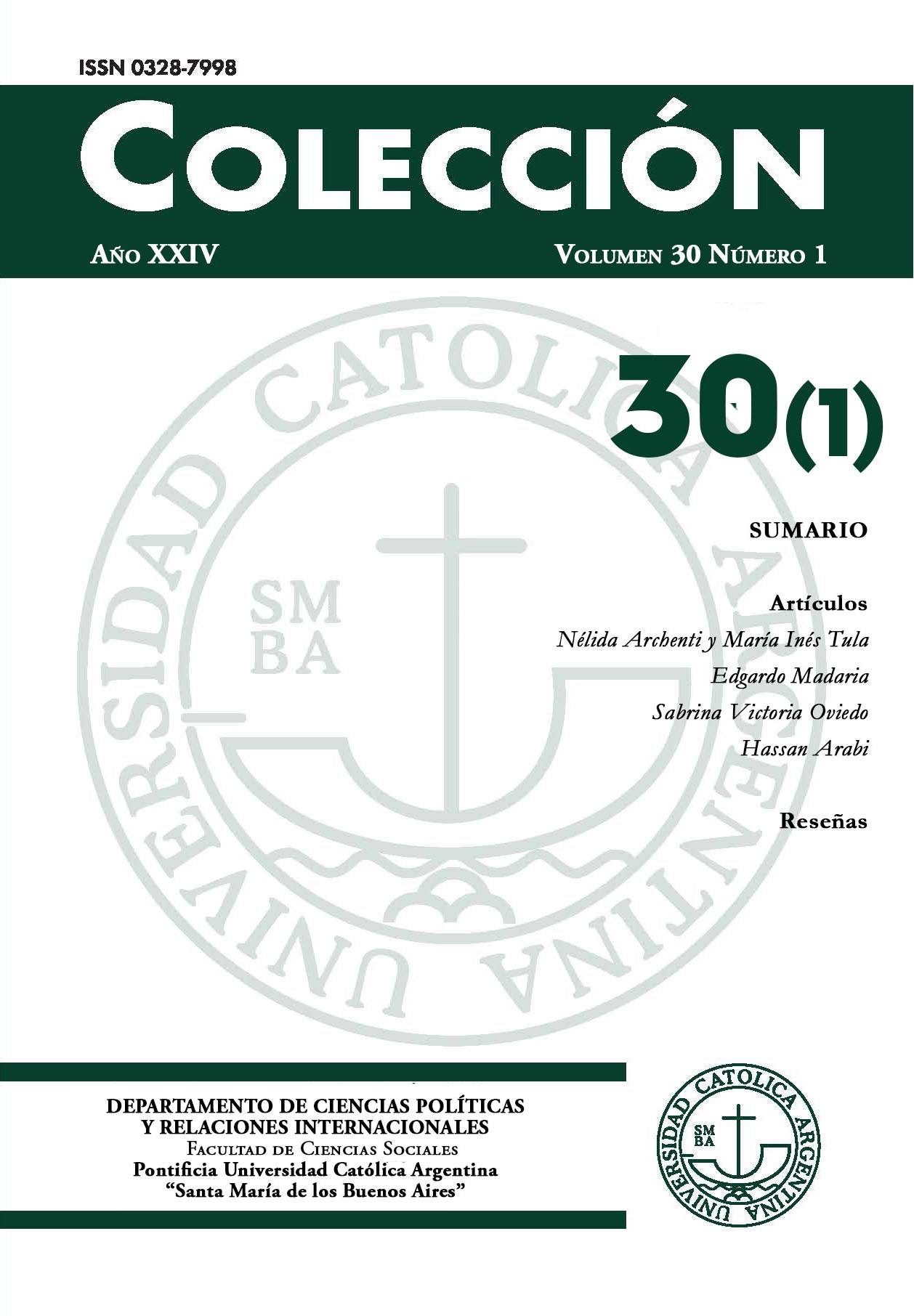Francisco Arias Pelerano: una aproximación a su pensamiento político
Keywords:
Arias Pelerano, ciencias políticas, cosmovisión, Estado, clase política, Mundo unoAbstract
Francisco Arias Pelerano founded and directed the School of Political Sciences of the Universidad Católica Argentina, leaving his mark on the formation of hundreds of political scientists. Following his teacher Arturo Sampay, he conceived the study of politics as a disciplinary plurality that includes philosophy, sociology, history and law, which are integrated into working through political prudence. He applied this epistemological conception to address issues such as the worldview, the State, the elites and, in relation to the reality of his time, the shrinking and the oneness of the world that, according to him, determine the appearance of a single world power and the disappearance of the sovereign national State, with the consequent need to realize the political integration of Latin America. Finally, his reflections on the Argentine crisis and the urgent need to form the new ruling elites with the content of the political sciences stand out.Downloads
References
Arias Pelerano, Francisco. 1968. “La enseñanza de la Política”. Universitas 4: 17-32.
----------. 1969a. “Cambio y Ciencia Política”. Universitas 9: 63-80.
----------. 1969b. Notas sobre la concepción del mundo y política. Buenos Aires: EUDEBA.
----------. 1970. Temas de Teoría Política. Buenos Aires: Editorial El Coloquio.
----------. 1972. “Filosofía y técnicas del poder”. Universitas 26: 59-63.
----------. 1977. “Arturo Enrique Sampay”. Universitas 44: 41-43.
----------. 1979. “Ernesto Palacio”. Universitas 50: 26-28.
----------. 1981a. La crisis actual de las Ciencias Políticas. Buenos Aires: Editorial FEPA.
----------. 1981b. Conversaciones en tiempos decisivos. Buenos Aires: Editorial FEPA.
----------. 1984. “Para una sociología del Derecho Penal”. Prudentia Iuris 12: 6-12.
----------. 1987. La integración latinoamericana es tarea política. Buenos Aires: Club de Buenos Aires.
----------. 1989. “Condiciones para la persistencia del sistema democrático”. Prudentia Iuris 21-22: 191-204.
----------. 1990. “Integración América Latina – Europa”. Prudentia Iuris 24-25: 82-89.
----------. 1991. “Contexto socio-político de la Rerum Novarum”. Prudentia Iuris 26: 106-111.
----------. 1992. “Reunificación”. Prudentia Iuris 29: 135-137.
----------. 1994. “Indagación filosófica del acto estatal no justiciable”. Prudentia Iuris 35: 93-102.
----------. 1995. La importancia de Arturo Enrique Sampay en las Ciencias Políticas contemporáneas. Buenos Aires: EDUCA.
----------. 1997. “Globalización hacia el siglo XXI. El espacio integrado como respuesta al desafío del Imperio Global”. Colección 6: 201-205.
----------. 1998. “Integración Sudamericana y Derecho”. Prudentia Iuris 47-48: 189-193.
----------. 2001. Consecuencias políticas de la globalización: El Imperio terráqueo. A Coruña: Ediciós do Castro.
----------. 2002. “Interrelaciones: la Filosofía y la Teología en las Ciencias Políticas”. Prudentia Iuris 56: 307-317.
Cervantes, Miguel de. 2000. Don Quijote de la Mancha. Barcelona: Editorial Sol 90.
La Pira, Giorgio. 1956. Para una arquitectura cristiana del Estado. Buenos Aires: Editorial Heroica.
Mouffe, Chantal. 2007. En torno a lo político. Buenos Aires: Fondo de Cultura Económica.
Ortega y Gasset, José. 2002. España invertebrada. Madrid: Biblioteca Nueva.
Palacio, Ernesto. 1949. Teoría del Estado. Buenos Aires: Editorial Política
Prélot, Marcel. 1987. La ciencia política. Buenos Aires: EUDEBA.
Sampay, Arturo Enrique. 1951. Introducción a la Teoría del Estado. Buenos Aires: Politeia.
Downloads
Published
How to Cite
Issue
Section
License










 Colección
Colección